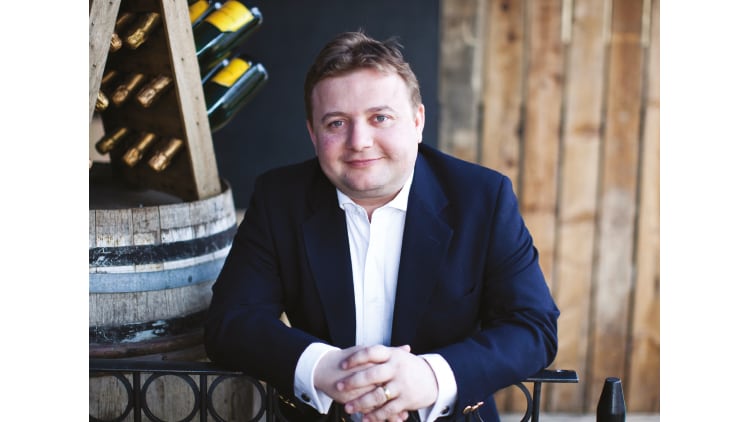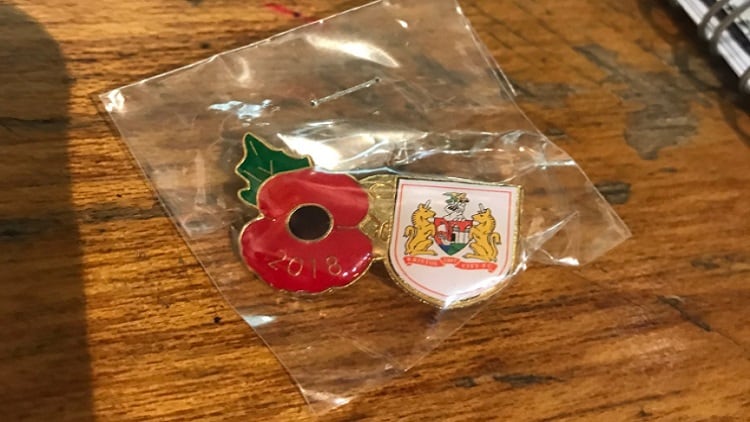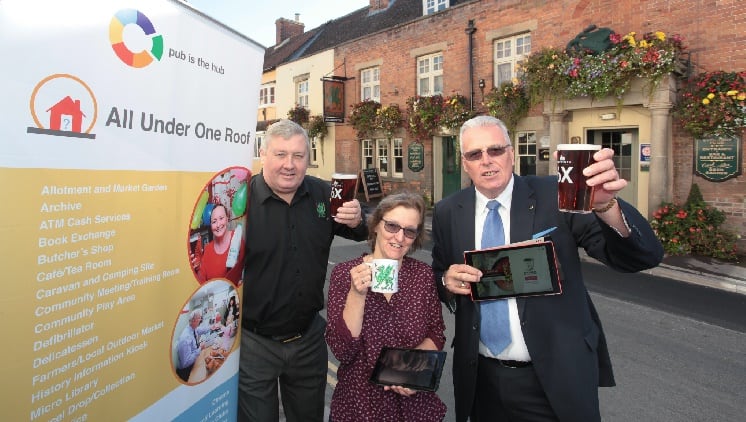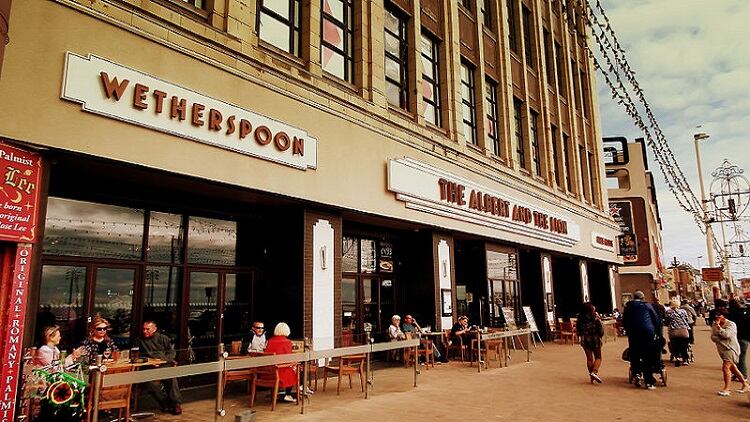The operator
The main thing about the Durham Ox’s ownership is that my wife Sasha and I own the freehold and we’ve been here for almost 20 years. We’re about to start our 19th year. But I have a crew of people who run this pub with me and I do other things around it.
I’ve had the Durham Ox since 1999 and when we bought it, it was in receivership and I was a young licensee at 28 years old. I still also think I’m a young licensee at 47.
In 2010, I opened a pub group called Provenance Inns & Hotels and, in 2017, I resigned as managing director, sold my shares and came out of that pub group back to the Durham Ox. So I’m back to one site again.
The main reason was that my wife and I wanted to focus on other things. I’m a publican through and through and most of the pubs in the group that we owned were either knackered or derelict. So we built them all up into a business that was turning over £15m.
I was running the pub here as part of the group, but I also have Ibbotson & Ibbotson, which is a consultancy business I run with my wife.
Sasha is very much all about interiors, design and sourcing, and I know the professional term would be interior designer, but she’d rather say ‘I’m good at colours and putting things together’. She’s very modest.
I’m not an old-fashioned landlord, although I’m here every day – but not playing darts or behind the bar.
I travelled a huge amount when I was younger because of my dad who was in timber and plantations. He lives in Malaysia and is a published author on all things Malaysian. My mother was from a large Italian family in Scotland where eating and drinking was very important. Meal times in our households were never a hardship – it was something we always did as a family. I experienced a lot of different cultures, cuisines and hospitality, and a lot of very exciting travelling and hotels that not a lot of people would be able to do, all because of my dad’s job.
I was at boarding school up until I was 18 because my parents lived abroad all of the time. I had a part-time job in a pub that I loved because it was good fun and I’m a personable person. When I left school, I went to university and did a foundation year in business studies and then looked around the hotel school in Westminster and it blew me away, so I transferred and did that.
I really wanted to be in hospitality. I’m really lucky that, from the minute I left school, I knew what I wanted to do.
I came across the Durham Ox when I was looking for a really good food and beverage outlet. I wanted to open a restaurant with a bit of a bar and it never occurred to me that a gastropub at my age was the way to go.
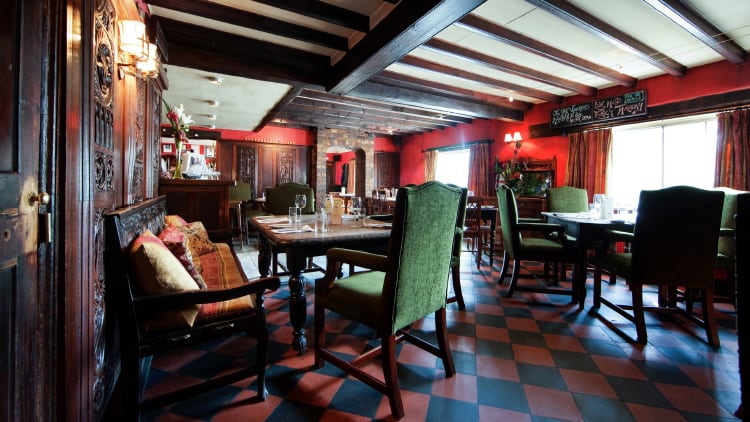
The pub
Originally, it was an old farm and had a lot of interesting buildings in different states of repair. When we took it over, the main pub was smaller and, within a year, we started converting some of the outbuildings into bedrooms and we have six of those now.
We have a cottage in the village with another three bedrooms and added a marquee a few years after that and, five years ago, we converted that into a barn that seats 80 people. It’s grown bit by bit and we weren’t borrowing huge sums of money, but did it from the grassroots.
This pub is one of those pubs that’s very hard to describe. When there’s no one in it, early in the morning or late at night, it still has a certain feel about it. Part of it is very old, part is oak panelled, there are open fires and mismatched stone floors and we’ve added bits over the years. We didn’t move in and do
everything at once on day one.
Running a pub is not about who has the most expensive china and the tallest candlesticks. The kit, the toys and the regalia are good, but it’s also about whether or not you have a mowed lawn, and making sure things like the hanging baskets are alive.
Being blunt, if you invite people to your house you want them to be well-fed, you don’t want them tapping their glass. You want to be a good host. That to me, in our industry, has been watered down.
The offer
We’ve got a taproom and we have always embraced people who come in and drink. We serve real ale, Champagne and Prosecco, but you can also come up with your kids and have a chat. We have 100 covers across the main building, but started out with about 40. To get to that, I made a bigger kitchen first. Often you’d do it the other way around, but I spent a lot of time in the kitchen in those days, so I wanted it to be nicer.
I now have my own chefs, but I write and design the menus and, in the previous pubco, that was my job. I also do private dinners for people. I don’t do service in the pub any longer, but I am the tester and the buck stops with me.
We had the core lunch, dinner business and people for breakfast when we had the rooms. It started off in the summer, when people asked if we could do things. So we put the marquee in, which became our barn, and all of this led to outside catering and that meant that when we had good weeks it would be great – like when we have weddings on.
We have a very large garden. There’s a big field and a paddock. Sasha does all of the garden and we’ve made it winter-friendly because it has to be usable for brides and grooms.
We’re going to make it more practical with covered areas you can use all year round. We’re thinking about outside cooking and an outside bar where you can smoke cigars and sit and have supper in the winter. We want to continue landscaping our gardens, put some vegetable gardens in and create some more all-year outside seating areas.
We also want to add to our bedrooms. Accommodation, in my experience, has been a constant growth area. If anyone has such an opportunity, I would say don’t think about it. Do it. We get a very fair rate and my plans are to increase the rate and not the occupancy percentage and that’s because I want to offer my guests more and that’s a ‘watch this space’ kind of thing.
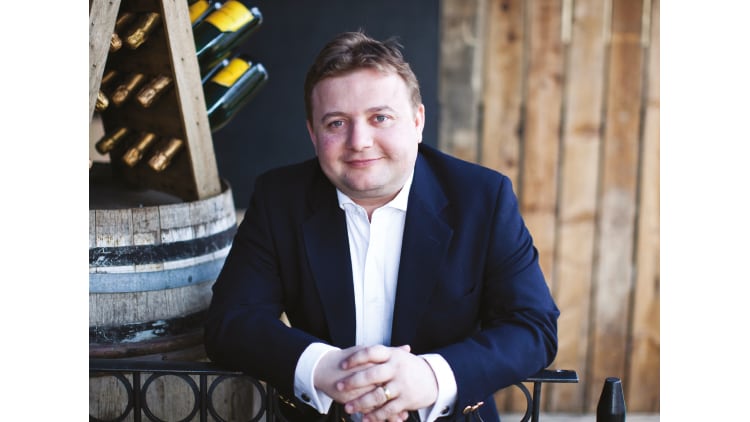
Food
We’re food orientated. Although food and wet is 60:40 I would say that of the total booze we sell, 80% of that is sold because of food.
One of our most popular dishes is a classic prawn cocktail that’s not deconstructed. It’s a proper Marie Rose mayonnaise that’s seasoned properly. It’s good prawns that are defrosted properly and it’s garnished with a proper big prawn and the lettuce is fresh and crisp and we put apple through it and it’s lovely. We charge £9 for it.
The next most popular is our queen scallops. It’s queen scallops, garlic butter, Gruyère cheese, butter and Cheddar and under the grill and a basket of brown bread and a slice of lemon. Both dishes went on the menu 11 years ago.
Crème brûlée and sticky toffee pudding are always on the menu. They are classics. Sticky toffee pudding also isn’t the easiest thing to make at home. It’s a popular dish and we make it into sticky toffee sundaes on Sundays and we have tarte Tatin and crêpes too.
We do Asian versions of belly pork and we also, when using game, make venison curry.
Drink
Beer wise we have a local York brewery beer called Guzzler, we’ve got Black Sheep because I really like the Theakston family, I think their products and their marketing is great.
We have Timothy Taylor on too. We have three real ales and we have a fourth pump too that might change seasonally. We used to rotate our ales a lot, but found three that are award winning and have provenance and they shift a lot.
Lager wise, we’re finding that the market is more pronounced than it ever was. More people are drinking lager over ale than ever before. Maybe it’s a summer and a winter thing – we see that too.
Foster’s and Amstel are our house pints and Birra Moretti is our stronger one. We also have Heineken Extra Cold and people like our frozen glasses, which work well. We’ve got Guinness and a cider on too. It’s a good range.
Spirits-wise, we’re moving forward. We did a lot of what everyone else has done. We had 30 to 40 gins and we’re now paring it back to 10. This is because the important thing is that people know how to make a really good gin and tonic rather than just having lots of things on shelves. We’ve got three gin makers close to us. In fact, we’re going to have a gin made specially for us. It will be our house gin but it won’t be the cheapest. Cooper King is three miles away from us and they will be making it.
There’s also another local distiller that makes a fantastic rhubarb and ginger and other gins. So, I’m going to have different gins, but focus on locality too, I want to do something different with six or 10 gins on the menu.
On our wine list we used to have a lot, because of my wine background, but I put my business head on and ensured that we now just put good things on.
We now have about 25 whites and 25 reds, which is still quite a lot, but technology helps because you can open them and keep them for longer.
What we’ve noticed is that people will splash out on a £50 to £60 bottle of red, rather than a white, which might be related to our food. But what we have also done is open a lot of the better stuff by the glass and then it doesn’t hang around. We have been selling a glass of wine at £15 to £16.
I’ve also read a lot in the press about the pub lunch being over and we’re certainly finding that people are having one course and having something really nice to drink with it. They are definitely drinking less but better at lunch time.
Maybe it’s a combination of things here. We’ve done a super value pub lunch menu where people can have 125ml of Chablis at £8. It’s about trying things. The best test is your customers and I ask my customers direct question about what they would like to see on our menu. If five or six people say they want something then we will put it on.
Events
We do ladies’ lunches and they’re hosted by my wife. The literary events are depending on what appeals. We had a fantastic lady who was an ex-prison governess and that was a sell-out. We have a lot of authors. We had a diplomat’s wife who wrote crime novels and that was also popular.
We do a food market and we’re looking to do one a season. Sasha organises Christmas fairs for charities. They don’t make us any money, but we do them for the charities.
Then I have a programme where I host food and wine lunches. These tend to be on Thursdays for 24 people.
They usually involve a winemaker or merchant and I love doing them because they are more gastronomic events and give my chefs an excuse to display a bit of flair. They tend to revolve around a five-course tasting menu and the chefs get to play around with that.
The gastro wine lunches can be between £35 and £65 a ticket but everyone who comes to those would usually say that’s pretty great value.
We followed up on a piece in the Yorkshire Post about loneliness and created what we called Friendship Lunches. We heavily subsidise the lunches rather than provide them free because we don’t want people to feel they are being patronised. We want people to come here and socialise and not feel like charity cases.
People pick up friends and bring them out for a lunch that is classless. We’ve been doing it every month for three years and we get a minimum of 35 people every time. At the Christmas lunches we get 60 or 70 and they’re magnificent. The kids from the local school come up and sing carols.
It’s not about money. It does not fill our tills. But, at the end of the day, on a Monday, it’s great. What harm is it doing? I encourage other pubs to do it too. It’s nice – and it’s not to be massively community spirited, it just feels good.
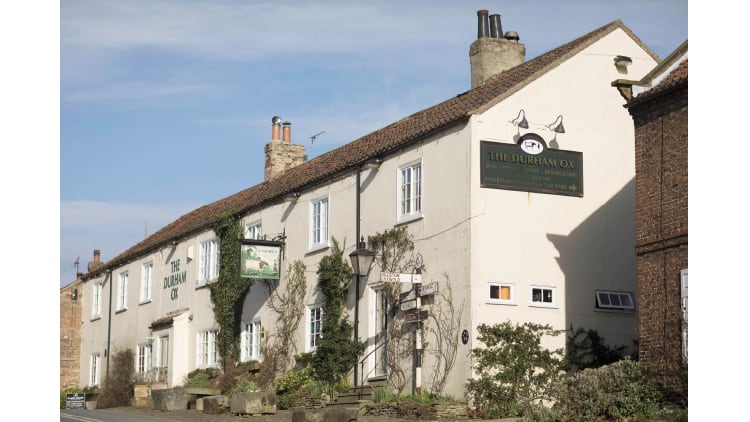
The future
I’ll be very honest, I thought there were three things I could do when I left the pub group. You can do nothing, which is dangerous. You can sell the business, which is lazy. Or you can work on it and invest in all areas – financially, time wise and in training and mentoring people.
To do that is to expand what we do. We have a good solid business. This is a hard business, especially these days. You can have a good business and it still won’t go right. In the old days you could do a bad job and still get by.
I want to do more on the food scene with food markets such as street food and I want to spend on things you can’t see like fixing the roofs and windows, but it needs to be done. But the main thing is new capital expense. There are a couple of buildings I want to convert and I’ve got land that I want to put more bedrooms on.
And that to me is expanding the accommodation, working a lot closer to the other holiday accommodation businesses in the area that don’t have food or drink offers. We also recommend them as rooms when we don’t have any.
That will also hopefully take me into my 50s. I enjoy the garden and growing it and we could provide winter and autumnal fruits. I also want to continue my consultancy with people, which can include design and build, troubleshooting and things like that.
I’m happy to share my advice. I don’t know it all, but I know I’ve made mistakes and I can share that experience.

